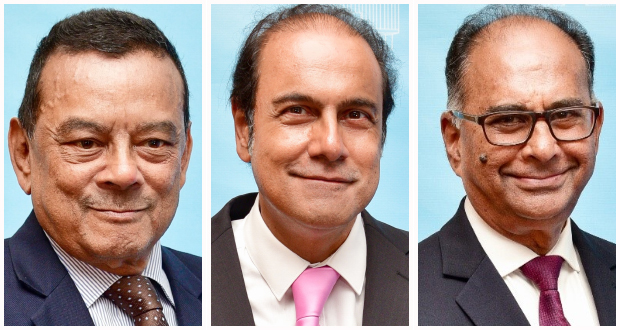Publicité
Elderly care: an assessment of level of protection
Par
Partager cet article
Elderly care: an assessment of level of protection

Introduction
Accept it or reject it, today?s story of economic success in Mauritius has been realised through the exploitation of our parents, particularly those of the working class, motivated by the aspiration to minimise, if not to overcome, the whip ends of years of abuse. In this era of growing political consciousness and impatience for immediate rather than postponed satisfaction, I cannot remotely imagine that today?s youngsters will put up to even a minimum of the nature and degree of exploitation and abuse which Mauritian pensioners, like the biblical Job, had patiently borne in silence for so long. Nevertheless, the current government, whose members have undeniably been empowered thanks to the sweats, blood and tears of their elders, is debating how to reduce social security benefits for the pensioners, many of whom are already fast approaching the end of their harsh and perilous journey. Mauritius Abroad (March 2003) reported:
?The Minister of Social Security, National Solidarity and Senior Citizens Welfare has twice announced over the past year that abolition of the old age pension for certain category of senior citizens??
Definition of elders
In the legal context of Mauritius, elders can be defined as those who have worked and lived until retirement at the age of sixty. In the cultural context, however, the elders are much older Mauritians, with attributes of highly enriched life-experience as a result of having the opportunity of going through the process of marriage, bearing responsible children, seeing their children married and having grand children. In addition, they should possess such qualities and charisma that attract respect and admiration from the younger generations, who see them as good role model to emulate.
In the uniquely fascinating recently published study, entitled Minority Elder Care in Europe this age-group has been defined thus: ?Elders or elderly are classified here as those aged 50 +?.
However, the editor of this survey added this caveat:
?We recognise that individuals in this age group may not see themselves as ?old?, whether they come from minority backgrounds. The age classification is, however, used to describe a group that, in one way or another, experiences issues of ageing?.
Growth of elder population
The unprecedented growth of an ageing population is an inescapable universal phenomenon. This is also reflected in the U.K. elderly population and other societies in the West. The above survey made this emphasis that this ?? pattern is that of an ageing society?.
Mike Brogden reinforces this point thus : ?The outcome for Western societies is that the proportion of people aged 65 appears to have doubled in the latter half of the twentieth century?. He continues : ?The number of people aged 60 and older increased by 125 per cent in industrial countries to 214 million in 1995; and by 200 per cent in countries such as China, India, and Brazil to reach 330 million?.
A United Nations (1998) demographic projection showed that by 2050 non-industrial countries could have more than four times as many elderly people as industrial nations.
Focusing on Mauritius, which is the primary aim of this paper, the projection for the age of 60 + is as follows (Mauritian Abroad, December 1998):
?In June 1995, there were 95,000 people aged more than 60 years in population of only 1.1 million. This figure is expected to rise to 119, 000 in 2005, 177,000 in 2015, 260,000 in 2025 and 313,000 in 2035?.
To summarise: the frightening rise in the world population is a potential demographic time bomb in terms of adequate resources and support.
The problem of longevity
Two factors contribute to the upward trend of the ageing population: the downward trend of birth rate, thereby resulting in the proportion of older people increases faster than that of the children; second, improvements in higher standards of hygiene, easier access to medical treatment, health consciousness through better educational facilities and the availability of more choices in diets.
Longevity poses serious dilemmas for government and the formulators of social policies. With progressively fewer workers supporting a growing army of pensioners through the progressive tax system, there is already a growing rebellion against increasing tax deductions. This is not limited exclusively to Mauritius. The anti-income tax rise movement, exploited by the Opposition politicians, political opportunists and others with no social conscience, is particularly more vociferous in the West and other affluent societies.
In my view, there are three ways of dealing with the problems of longevity. First, there should be a campaign against discriminatory practices against the elderly, which are protected by legislation and enforced in the court of law. With all of us, if we are lucky, having the opportunity of living through mature old age with respect and dignity, which we have earned, we should stand defiantly against ageism rising from any quarter.
Second, there should be a flexible limit on the age of retirement. The incentive of a higher retirement pension for those who continue to work after the pensionable age is one way of increasing the workforce, thereby lessening the pressure to raise income tax in order to support the Mauritian elders. To combat the problems posed by elder population growth in U.K., there is a progressively strong movement encouraging healthy pensioners to return to work. Some of them have chosen to work on a part-time basis. Old age does not always reduce one?s skills, competence, knowledge and wisdom; it is often an asset which enlightened employers appreciate and make great use of. The do-it-yourself superstore, B & Q, is one of the many employers who are taking advantage of the work contribution of older people. Mauritius, where hundreds of employees are imported for reason of shortage of home-produced labour, will be wise to take a leaf from the U.K.?s book.
Lack of imagination
Although there are so many options to combating the problems posed by growing elder population in Mauritius and, as a consequence, pressure put on the pension fund, Minister Samioullah Lauthan, whose portfolio also covers ?Welfare of Old People?? is toying with the idea of ?means test? (l?express, 21.4.2002, Mauritian Abroad, op. cit. Dec. 03) for certain category of pensioners. The term ?means test? is usually applicable to those having an income above a certain level set by some form of rules, i.e. if someone has an income of, say, £100 weekly, he will not be entitled to Income Support. If means test were applied, in my experience, it would raise a number of questions, as well as issues. Will those not satisfying the criteria set by the means test be returned of their contributions going towards Old Age Pension? Will it not also contribute to fraudulent practices by some unscrupulous persons by not revealing their real income? If means test is introduced, will it not reward the lazy and the crooks who will try to limit their official earning and take the extra earning in cash? If means test is applied without some positive thinking, it will be a disincentive to hard working Mauritians, who invest and save for the future. The Old Labour Party was out of office for 18 years as a result of its utopian socialist vision of creating a society of equal by bashing business enterprises and the creators of wealth in favour of the scroungers in the working class. The New Labour Party, facing the real world as it is, operates within the framework of a political philosophy of reward for hard work and, as a result, is most likely to have a third consecutive term in office.
The problems of old age
Returning to the topic of care and protection for Mauritian elderly, it seems that resources have unexpectedly out-stripped this age group. This brings Thomas Malthus (1798) to mind, who, in relation to population growth in England, argued that there would not be sufficient provisions to maintain the growing population unless birth rate was drastically reduced. Has Mauritius reached this critical stage in view of its elderly population?
Under current government thinking, Mauritian elders? pensions appear to be under threat, which does not augur well in view of possible further attacks in other areas, i.e. in subsidised leisure activities, travelling, health, etc. The authorities should be aware that the elders are here to live so long as life continues. Therefore, they do not only need protection against financial support, but they also need help with the other difficulties intrinsic with old age.
The extensive range of problems confronting old age have come home most clearly to me in my involvement with clients from the age 60 to 90 + in a recent employment capacity as manager/senior practitioner capacity in a multi-disciplinary team. Sitting alone in an old armchair in a one-bedroom flat, on the ground-floor of a large multi-occupant building, with deteriorating eye-sight, limited mobility indoors, in a partly torn pyjamas exuding a strong smell of urine, recovering from a second suicide attempt, was an old Englishman. Suffering from severe depression, he asked me: ?Who has invented old age with all its worries?? I had no answer for him. His depressing condition brought distressing flashbacks of fieldwork in Mauritius for my doctoral thesis (1996). He also reminded me of my recent study on social exclusion on the island of Rodrigues (2003).
Old age, as already indicated, does not only bring on physical deterioration, but it also subjects one to a number of debilitating diseases. Some of them are so incurable that one can do no more than simply providing palliative attention.
One of the most debilitating diseases affecting old age is senile dementia. Senile dementia falls into two categories: Alzheimer?s disease, which is also referred as senile dementia of Alzheimer-type, and multi-infarct dementia. It can be defined as a brain disease, giving rise to impairment of higher intellectual functions. The effects of dementia include memory loss, dysfunctional communication and personality disorder. Pre-senile dementia usually affects those falling between the ages of forty and sixty. Sufferers from dementia start from the age of 65 +. Multi-infarct dementia refers to localised area of dead tissue resulting from the failure of blood supply.
Some of the symptoms of this disorder are accompanied by sadness and apathy, anxiety and apprehension, insomnia and behaviour distortion. Incontinence is common among those affected by dementia. Narainsamy?s interview (l?express, 5.11.2000), discussing the case of an elderly respondent, beaten up by her grandchild for bed-wetting, is a sufferer from Alzheimer?s disease.
Do we know how many Mauritian elders suffer from dementia, who are subject to abuse and have no protection of their welfare? It does not appear that this is a priority for the government.
Some symptoms of dementia
Briefly, dementia has three levels of severity:
? Mild Dementia
The indicators are as follows:
i) Memory impairment, particularly short-term memory.
ii) Subtle loss of activities of daily living and complex tasks.
iii) Language difficulty to articulate words.
? Moderate Dementia
i) More obvious memory loss.
ii) Behaviour changes.
iii) Verbal difficulties.
iv) Communication problem.
v) Loss of function of daily living activities.
vi) Personality changes.
vii) Inability to cope with daily living activities unassisted.
viii) At risk.
ix) Require home care support.
? Severe Dementia
i) Wandering.
ii) Aggressive behaviour.
iii) Incontinence.
iv) Loss of communication.
v) Require residential placement.
Brutal reaction of ignorance
In more advanced societies, the problems associated with old age are recognised and provisions are made to manage them, conscious of the fact that no one, princes or paupers, rich or poor, is immune from the difficulties, unless one dies young. Financial and professional supports for Alzheimer?s disease are available for the victims of this difficult and unpleasant health disorder. Ignorance of the problems among the Mauritian population seems to be a major contributing factor exposing many of the Mauritian elders to abusive and cruel treatment. However, one cannot always put all the blame on the perpetrators of the brutality, as the symptoms of dementia are too difficult and complex for the ordinary folk to understand. Heinz et al. (eds.) stated: ?Not infrequently subtle changes in personality and behaviour or slight forgetfulness remain unnoticed until a sudden deterioration occurs as a result of some environment change?? Countless must have been the time when we have heard an elderly member in the family is accused of, and shouted at, behaviours regarded by a younger member as getting too problematic to handle. As a consequence, many of them are abandoned to their own devices or quietly deposited in a residential home, as graphically illustrated in my Social Welfare in Mauritius (1996). Myriam Narainsamy, in her interview to l?express (op. cit.), did not only validate this evidence but also explained how unprotected against cruel and inhuman treatment that many Mauritian elders are being subjected:
?J?ai été bouleversée par le cas de cette Nani que sa petite-fille frappe à coups de bâton, sur ordre de ses parents, parce qu?elle souffre d?incontinence et fait pipi au lit?.
This is a case of an undiagnosed advanced Alzheimer?s disease, as pointed out above, which contributed to incontinence of urine. It is not the Nani?s fault. This is a blatant case of cruelty perpetrated as a result of ignorance. With assistance from the Health Department, this problem is manageable.
Myriam also confirmed my findings of abuse and exploitation in residential homes, which, she said, ?? ces établissements poussent comme des champions??, let alone those who manage them possessing no skills or aptitudes to take care of such vulnerable residents like the Mauritian elders dumped by their relatives in profit-making residential establishments.
My concerns
Myriam Narainsamy deserves our sincere congratulations and encouragement for standing up for our most vulnerable compatriots, the Mauritian elders. However, this topic is a duplication of works that have already been carried out. Good researchers, in my view, should build on previous surveys and explore areas that have remained hitherto uninvestigated. My doctoral thesis, published as Social Welfare in Mauritius: A Critical Analysis of Social Service Provisions, 1996, has revealed, as already indicated, in sufficient detail in order to take the issue of elder abuse forward without much ado. Talking is over and action should begin. I published another paper, under the title of The Silent Sufferers, (l?express (17, 18, & 21 July 1998) highlighting in greater detail the same topic. I also directed the scholars and researchers to two major studies exposing cruel treatment against our most vulnerable compatriots: (1) Professor?s Titmuss? Social Policies and Population Growth, 1960 and (2) J.C. Chettle?s report, Feeding in Infirmaries and Orphanages, 1947.
Conclusion
There is ample evidence that a growing number of Mauritian elders are being abused and exploited not only by members of their immediate family but also by outsiders. The Narainsamy?s study is perhaps a more up-to-date example validating the fact that no civilised society can stand by, watching its most vulnerable citizens? human rights defiantly ignored, trodden on and abused. Myriam Narainsamy, working alone on this daunting project, with the shameful and token assistance of only Rs 25,000 from government funding for publication purpose, is a courageous patriotic lady. It is hoped that her effort and dedication will not end up like those of her predecessors on this subject: in the obscure corner of dormant files on the shelves. We hope and pray that the power that be will show their gratitude and respect to Mauritian elders, thereby setting up the legal framework for Myriam Narainsamy?s sterling effort in producing single-handedly the ?Convention sur la protection et les droits des personnes âgées?.
?Sitting alone in an old armchair in a one-bedroom flat, on the ground-floor of a large multi-occupant building, with deteriorating eye-sight, limited mobility indoors, in a partly torn pyjamas exuding a strong smell of urine, recovering from a second suicide attempt, was an old Englishman. Suffering from severe depression, he asked me: ?Who has invented old age with all its worries???
Publicité
Les plus récents






